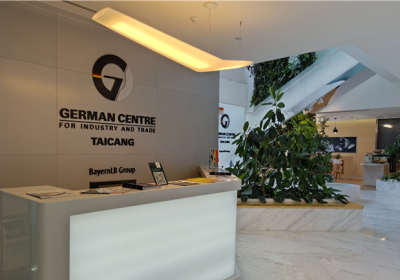Matthias Müller, general manger of Taicang German Center, spends about half an hour every morning driving from Shanghai to Taicang. Having been living in China for over twenty years, Matthias has learned much about China and its culture.
The German Center settled down in Taicang
Matthias first came to China in 1990, and he studied in Hangzhou four years later in 1994. After graduation he has been mediating among Chinese and German governments and companies. In the year of 2006, he joined the German Center in Shanghai, where he noticed Taicang, a county 42 km away from Shanghai.

The German companies in Taicang are among the first batch of foreign companies investing in China after the reform and opening-up policy. When the Taicang High-tech Zone was founded in 1993, Kern-Liebers was settled down in the same year, followed by Schaeffler, Siemens and TOX later. Up to now, there have been over 300 German companies in Taicang, making a value of gross output of RMB 50 billion.
“Taicang is the only county that attracts so many German companies in China,” said Matthias to JiangsuNow. He said that all other seven German Centers were set up in capital cities or big economic cities. The convenience of traffic, the favorable policy and fund support and the livable environment, make Taicang a popular place for German companies. “Smaller Chinese cities are developing very fast. For foreign investment, I believe that the smaller cities are the future,” he added.
Chinese market is changing among development
Matthias haven lived in China for almost 30 years. He surely noticed some changes and development during these years. “20 years ago, the main competitors were German companies or other international companies, but now they are mainly Chinese companies.”Another important change is that, “Instead of relying on exporting cheap products, China now starts to output brands. Matthias comes back to Germany every summer. In recent years, each time he walks into a store, he would see some China-made brand such as Huawei and mi.” Matthias also noticed that the after-sale service of these brands are also very good, which means these Chinese brands are taking a portion of the foreign market.
According to statistics by German Chamber of Industry and Commerce (DIHK) on January 27, 2017, China became one of Germany’s most important trade partners. "It used to be our European neighbors, such as France, Holland and the UK. But now it’s a country ten thousand kilometers away. This is also very special." He told JiangsuNow that Chinese market was so important that three out of the eight world’s German centers are in China. "More and more young Germans start to learn Chinese. When I was studying Chinese 30 years ago, I was the unique one. They are aware of the importance of Chinese market now,” he added.
"Beer Festival" and "Taicang Day" deepen culture exchange
The 2018Taicang Beer Festival kicked off in August 28. Matthias and the tenants in the center also joined the celebration.
Statistics shows that over 1000 Germans living in Taicang. Matthias regards the German center more than just a service center, but also a platform for cultural exchanges. Chinese and German tenants would celebrate western festivals such as Easter and Christmas, and they also celebrate traditional Chinese festivals like Mid -Autumn and Spring Festival.

Taicang government initiated "Taicang Day" in the year of 2008, to promote the city and Jiangsu province. Various kinds of activities help enhance mutual communication and enhance cooperation and friendship between the two peoples.
Taicang German Center has entered its flourishing period, and Matthias hopes to continue his role of a cultural link between China and Germany.






